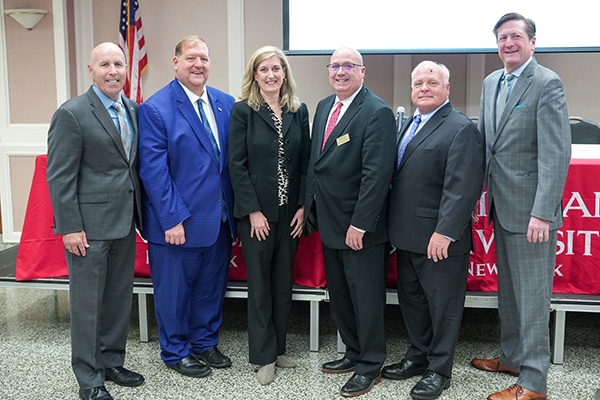|
RCBJ-Audible (Listen For Free)
|
Dearth of Housing For Millennials, Seniors and Rent-Challenged Impact Efficacy of Business Community in Rockland County
By Tina Traster
Plans for a large warehouse proposal in the Route 303 corridor in Orangetown have languished before land-use boards for years. Developer Gabe Alexander has been trying to snag approvals for the construction of two warehouses totaling 543,000 square feet on a 12-acre parcel at 155 and 125 South Greenbush Road.
For years, Alexander of Alexander Properties of New City, has had pushback from neighbors, the town, and county planners over increased truck traffic, loss of permeable land, adverse impact on the flood-prone Sparkill Creek and proximity to Clausland Mountain State Park.
Potentially exhausted over the fight, the developer did something unexpected: he asked Town Supervisor Teresa Kenny what the town would prefer to see on the parcel.
That was easy. Housing, according to Kenny, who participated in a Palisades Institute Summit sponsored by Dominican University last Tuesday in a panel of the county’s five town supervisors.
“When the owner reached out and told us he was willing to forego the warehouse, I suggested he propose housing,” the supervisor said, adding there is a dire need for condos and townhouses in Orangetown to house millennials, starter families, and people who are aging out of single-family homes.
The annual summit, which features a host of guests every year that are focused on economic development and governance, covered a volley of topics, including local infrastructure, rising crime, business development, and reminisces of the COVID pandemic response, which brought the supervisors closer and broke down partisan divides.
But no topic seemed more visceral and urgent than the need for housing, especially affordable housing.
“There is a need for affordable housing,” Kenny said. “But this issue is bigger than Orangetown.”
That said, Kenny was able to take a victory lap over the town’s protracted efforts to partner with the former HNA site.
“The town intervened; it makes you a partner,” she said, adding that the sale of the former HNA Palisades Training Center (the former IBM campus) 106-acre bucolic campus on Route 9W closed in July. The $26.3 million sale is slated to bring a redevelopment that will include a new hotel and 342 townhouses and apartments – though none are set aside for affordable housing.
Hudson Valley Pattern for Progress’s 2023 report underscores the affordability crisis for housing in the region, as stagnant wages, increasing rents, and skyrocketing home prices have stretched household budgets to their limits.
The report, Out of Reach Hudson Valley 2023, used federal and local data to examine the gap between wages and the cost of rental housing for those living in the nine-county region. Pattern also examined the affordability of homeownership throughout the Hudson Valley by comparing median home prices to the mortgages for which typical families would qualify in each county.
The data show a persistent and clear trend across the entire Hudson Valley: the cost of housing has pushed beyond reasonable levels of affordability for most. A single worker cannot afford fair-market rent for a one-bedroom apartment in any of the nine counties, and median home prices are more than $100,000 higher than the mortgage that typical families would qualify for in every county.
The issue is front and center in Ramapo.
What sets Michael Specht apart from the other supervisors is that rather than simply saying the county needs affordable housing, he’s working on it.
In May, the town applied to Empire State Development for financial assistance under the Restore NY Communities Initiatives. Ramapo is the only Rockland town that is a Certified Pro-Housing Community, a New York State program that has up to $650 million in state grants for communities that are actively working on expanding housing options, including affordable housing projects.
The New York State Pro-Housing Community Program is Governor Hochul’s “carrot” after years of using a “stick” approach to impose housing mandates on suburban communities that have been reluctant to expand housing options in their municipalities.
“We have an affordable housing crisis,” Specht said, during the panel discussion. “We have a severe shortfall. We have to dedicate more resources to affordable housing. There is nowhere for young working families to live. We have to get rid of arbitrary caps. We are not serving young people and seniors.”
The 2024 Rockland County Housing Needs Assessment, prepared by Pattern For Progress, says, “exclusionary land-use policies are a significant barrier to meeting housing needs in Rockland County.” In other words, most of the county’s housing is overwhelmingly comprised of single-family homes in single family zones.
The Villages of Haverstraw and Nyack have recently been certified as Pro-Housing Communities. The Village of Kaser has also applied to participate in the Pro-Housing Community program. According to the Rockland County Housing Assessment Needs report, 42 percent of the town’s (Town of Haverstraw) residents are housing burdened, while 52 percent of residents in the Village of Haverstraw are spending more than 30 percent of income on housing costs.
As of four years ago, the Village of Haverstraw was on track to add nearly 500 units of affordable housing spread out over three projects. One has been scuttled; the other two hang in the balance because they are waiting on the Town of Haverstraw to sign onto PILOT (payment in lieu of taxes) agreements. The Knights of Columbus had planned to sell their building in the Village of Haverstraw to an affordable housing developer for $2.4 million. The 100-unit project was quashed after the Town of Haverstraw struck a deal to acquire the building.
But both Westchester-based Westhab Inc., which is planning 81 affordable housing units and the Huntington, Long Island-based MPact Collective, which has proposed about 307 rent stabilized affordable and workforce housing units at the former Chair Factory site, continue to fight for their projects. Both are concerned about the town’s lack of commitment to the PILOTs to date — even though the IDA (Industrial Development Agency) and the other taxing entities support the developments.
Town Supervisor Howard Phillips has said in private conversations, according to sources, and in public spaces, Haverstraw has done its “fair share” of building affordable housing and that other towns in Rockland need to pick up the slack.
According to the Needs Assessment report, Haverstraw has 327 subsidized units, landing second to last among the five towns. Ramapo leads with 1,781, followed by 665 in Orangetown, and 527 in Clarkstown. Stony Point has the fewest, 89.
The path to affordable housing, Phillips said during the summit, should be “home ownership.” Phillips also counts the mobile homes in Haverstraw as “affordable.”
The supervisor added: “We don’t want them to be transient,” adding the only way to empower people is through home ownership.
The Town of Clarkstown has been building senior housing at a fast clip, but plans to build smaller apartments for millennials and empty nesters at the rezoned Transit Oriented Development site in Nanuet have stalled. Plans calls for more than 500 units in the TOD. The town recently approved an RFEI (Request for Expressions of Interest) to redevelop the Grace Baptist Church site, which the town bought in 2018 for $4.5 million. Affordable housing developers have brought proposals to the town to redevelop the site at 20 Demarest Avenue in Nanuet, but it remains to be seen whether a future project will include an affordable component and how it will be structured.
Clarkstown Supervisor George Hoehmann also alluded to the possibility of a housing component in both the Palisades Center, which is in foreclosure, and the Shops at Nanuet — both of which are looking to reinvent themselves as the state of retail continues to be severely impacted by online commerce and other factors.
The Palisades Institute was created in 1990 as part of Dominican University of Blauvelt, New York to serve for-profit, government, and not-for-profit organizations in Rockland and Orange counties in New York, Bergen and Passaic counties in New Jersey, and other nearby areas. It offers seminars and workshops which address issues related to the integration of the principles from a variety of perspectives.














